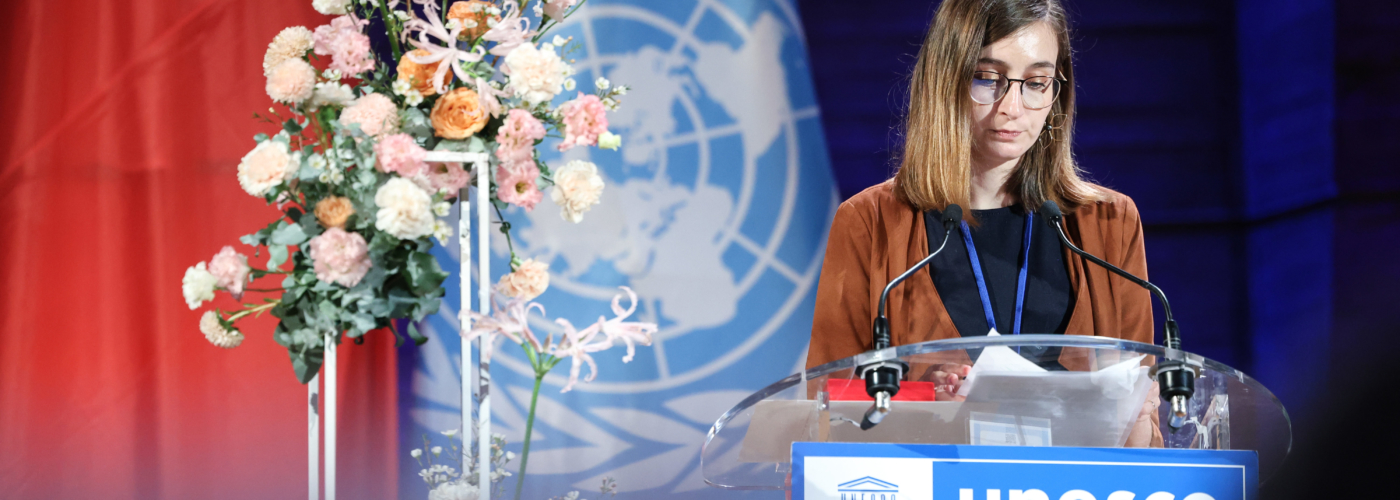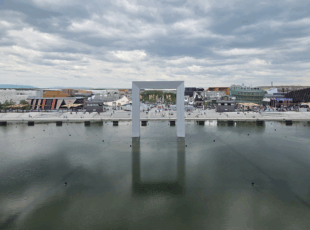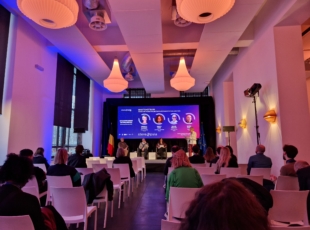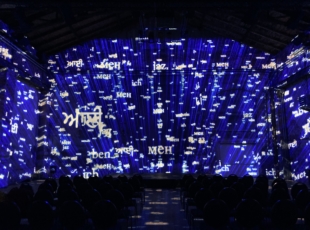Sarah Descamps, UNESCO prize winner: ‘Responsible digital solutions to protect the planet do exist’

Article author :
In September 2024, Sarah Descamps, a researcher and doctoral student at UMons, placed Belgium in the spotlight in the world of Information and Communication Technologies (ICT). From studying to be a history teacher to a speech on the UNESCO stage in Paris before the great and the good of the international education domain, there is but one small step. Or rather several, synonymous with unrelenting work.
Thanks to her online guide, in 2023 Sarah Descamps was awarded the prestigious UNESCO King Hamad Bin Isa Al-Khalifa Prize for the use of ICT in education. Its sobriquet? ‘EducoNetImpact’. It advocates environmentally responsible use of technology. A pedagogical gem of digital solutions which the climate would be warmly thankful for if it could express itself.
Sarah Descamps conceptualised this guide as part of her doctorate, developed at the UMons Pedagogical Engineering and Digital Education department. She explains: ‘My thesis focuses on the teaching of digital sobriety. In other words, I want to raise awareness amongst young people – but also adults – of the environmental impact of new technologies.’
Far from being a process involving the handing out of lessons, the researcher continues: ‘The aim of my guide is not to banish new technologies from daily life or solely pointing out that they are harmful, because that is not the case. “EducoNetImpact” shows that responsible digital solutions to protect the planet also exist.’

‘EducoNetImpact’: a carefully crafted tool for teachers and pupils
‘I didn’t want to end up with a thesis which not many people would read because, let’s be honest, that is often what happens’ (laughs). She then came up with the idea of creating a tool which could help out in concrete terms, because, as she likes to emphasise, ‘my profession really consists of being on the ground. It is nothing like the profile of the researcher who remains in their laboratory carrying out experiments.’
Her aim: to raise awareness amongst students and to help teachers by taking into account their work-related reality. Therefore, before being placed online, the project was tested amongst 1,000 teachers. The Mons-born researcher clarifies: ‘this online pedagogical guide consists of vast resources intended for teachers, which they can dip into for their courses. The goal is to develop the protection of the environment as a digital skill.’ The guide was refined and modified on the basis of feedback received in the field, in the classroom.
‘EducoNetImpact’ includes a self-training course, ready-for-use learning materials, games for different age groups (from 5 to 15 years) and other interactive resources which focus on a range of subjects (such as the indirect impact of technologies or on AI).
The impact of the digital domain affects us all
As Sarah Descamps emphasises, her guide is intended for everybody (not only the teaching body) who is curious about their digital impact. On ‘EducoNetImpact’ can also be found very no-nonsense information sheets which raise questions about our everyday habits.
What do we consume when we play video games? What is the environmental impact of our Cloud? What happens when we carry out an internet search? How about the impact (positive and negative) of 5G? What is Greenwashing and how can it be decrypted? So many themes which are accessible with a single click.
Is it one of those ‘the digital really does pollute’ things? Spoiler alert: yes
Already in 2018 the Shift Project’s study ‘Towards digital sobriety’ sounded the alarm by reporting that the digital realm’s energy consumption was rising by 9% annually and pointing out that: ‘it is possible to bring it down to 1.5% per year by adopting “digital sobriety” as a working principle. The digital transition as it is currently being implemented is contributing to climate disruption more than it is helping to prevent it. Action needs to be taken urgently.’
On its site, the Mons citizen’s pedagogical guide publishes eye-catching facts: did you know that streaming generates as many greenhouse gas emissions as Chile? That the digital footprint as a whole is larger than that left by our plane journeys?
The ‘EducoNetImpact’ tool is thus proving to be of unremitting usefulness, backed up by figures, because, in 2024, the digital realm accounted for between 6 and 7% of greenhouse gases, as is specified by the RTBF’s programme, ‘There is no Planet B’.
Psssst: if you want to, you can do a bit for the planet right now. On kingkong, all of our articles can be read in ‘low carbon’ version. Run that past me again? Everything will be explained over here!
Planning to be a history-geography teacher, ending up being the ‘Greta Thunberg’ of the UMons
It is with a large helping of spontaneity and humour that Sarah confides that, at the UMons, she is often nicknamed ‘Miss Environment’ or ‘the Faculty’s Greta Thunberg’, and that it brings a smile to her face: ‘above all when I turn up in my yellow K-WAY.’ However, nothing in her background suggested she would end up opting for this career path: ‘I had a pretty standard education. With the learning challenges many pupils can experience. I found maths and the sciences difficult. I had to work hard to get my grades.’
As a teenager, there was already a bit of a geek within Sarah, as well as an emerging passion for the digital: ‘when I was at home, I considered the PC as entertainment. At the beginning of my secondary studies, I loved putting my notes in order on WORD or on PowerPoint. Whilst that is common practice nowadays, at the time I was the only one in the class who did that. I also chose the computer studies option. Even if it was only a course of two hours a week, the connection with the digital was already there.’
Initially, Sarah set out to become a history-geography teacher. The world of academic research and ICT were totally unfamiliar to her. It was during her Master’s in Education that she had her lightbulb moment.
In her year, the route for the students was all completely mapped out, but Sarah decided otherwise: ‘everybody chose the teaching and learning option (to become a teacher). And the more I progressed in my school pathway, the less this career appealed to me.’
It was a CD-ROM game for children which clinched the decision for Sarah. She offers us this wonderful anecdote: ‘if I chose an “educational technology” option, it’s thanks to games such as “Smart Rabbits”. When I was little, I spent hours at my PC learning whilst enjoying myself. As far as research goes, it’s due to my head of department. He offered me a job as part of the excellence pact. I was still a student. I loved it, that was the revelation.’
A ‘forgotten’ digital skill and a UNESCO prize in the bag
Once she had bagged her Master’s, Sarah Descamps decided to get started on her thesis: ‘I had spotted a digital skill which had never been made use of in the scientific literature.’ It was this notorious forgotten skill, treated as an afterthought at best, which would pave the way to creating ‘EducoNetImpact’. She adds some flesh to the bones: ‘The European Commission had established a digital skills base (for example: “learning how to search for information online”). Amongst them one little skill had hardly been addressed, the one dealing with “protecting the environment”. That is how I fell into my research field. To roughly summarise, its aim is to make each citizen aware of the digital’s impact on the environment.’
This discovery dates back to 2020. Four years later, thanks to the tool she had developed, Sarah Descamps found herself a prize-winner presenting her project on the UNESCO stage before an international jury of experts in education. A highly emotional moment, tremendous recognition and above all the opportunity to increase the visibility of teaching digital sobriety and the importance of developing it. Her candidacy stood out amongst the 71 applications submitted by 39 UNESCO Member States. ‘The jury in particular appreciated the fact that my theme is not often addressed in education, even though it is vital,’ Sarah Descamps points out.
A magnificent showcase for work requiring long-term commitment, with the sum of 25,000 dollars into the bargain, earmarked to continuing the development of ‘EducoNetImpact’. Moreover, since she won the prize, the fledgling Mons researcher has received masses of requests and invitations. She would like to have ‘EducoNetImpact’ translated into English to reach out to even more people and, once her thesis has been completed, why not become an entrepreneur providing consultancy and training?
A story, projects or an idea to share?
Suggest your content on kingkong.
also discover

From Belgium to Japan, the new territories of creative digital creativity

Stereopsia, the key European immersive technologies hub

NUMIX LAB 2024: creating bonds and building the future of digital creativity


